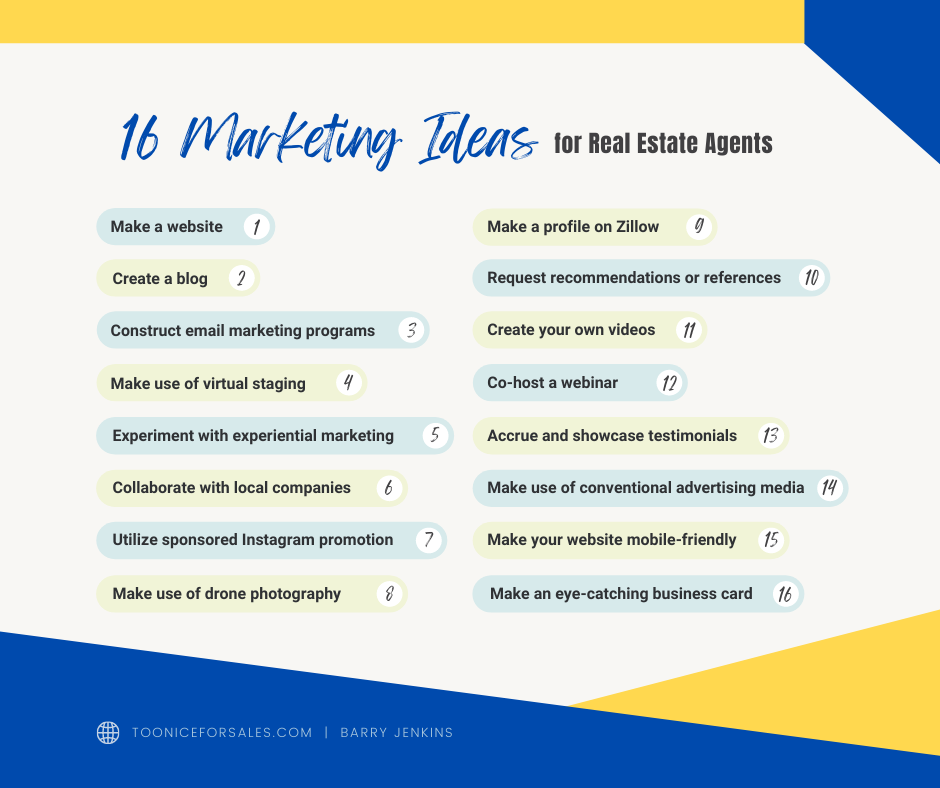Marketing Ideas for Real Estate Agents
Real estate is a sector that is both challenging and possibly rewarding. According to a 2020 research conducted by the National Association of Realtors (NAR), 88 percent of purchasers recently acquired their house through a real estate agent or broker.
According to the same report, 73 percent of buyers interviewed just one real estate agent during their house search, highlighting the necessity of raising awareness and getting in front of consumers as soon as feasible. As a result, having a thorough understanding of real estate marketing is a prerequisite for everyone working in the industry.
Below is a list of real estate marketing techniques that top agents utilize to advertise their firms below. Whether you're just starting out or an experienced realtor trying to attract new customers, these marketing suggestions can assist you in developing a successful marketing strategy.
1. Make a website
Many customers use the internet to research products and services before making a purchase. Building a website for your real estate company can show potential clients what you have to offer. Feature listings on your site and maintain them up to date; this will keep prospects coming back as they look for homes.
And don't be afraid to try something out of the ordinary to make your website stand out. Consider this mortgage calculator, which is a simple value addition for visitors.
2. Create a blog
You may also launch a blog and publish SEO-friendly material. This guarantees that your postings appear in prospect search results on a consistent basis. Google Analytics and Ahrefs are two tools that may help you identify the search phrases and keywords that your target clientele are looking for, as well as inspire you with new topic ideas.
Make it simple for them to find your primary website and connect to your profile pages on other real estate websites so they can learn more about you and your company. Also, don't forget to include eye-catching graphics in your postings.
3. Construct email marketing programs
Put out a monthly newsletter with a recap of your blog's material, and notify contacts when new property listings become available. Include property photographs that connect to the entire listing, a video tour of the estate, or a virtual staging of the home.
4. Make use of virtual staging
How can you attract the curiosity of potential buyers? Using a virtual staging website, you may give them a sneak peek at what the house looks like. Online staging saves you the time and money that would otherwise be spent on physically staging the property. In addition, according to a 2018 research of 4,200+ properties, 85 percent of staged homes sold for 6-25 percent more than unstaged homes.
5. Experiment with experiential marketing
Experiential marketing stimulates your prospects by "inviting an audience to connect with a business in a real-world setting." Have a tour of the region you're selling in, conduct an event to teach local homebuyers about the home-buying process, or organize an open house and allow purchasers to visit the property.
6. Collaborate with local companies
Use your local contacts to advertise listings and invite clothes stores, home décor showrooms, and coffee shops to join in an open house event. Set up pop-up stores in different parts of the property to entice prospects to attend your open house.
This motivates potential buyers to look about each space, and you may collaborate with local companies to identify discounts on things that can be given to house purchasers.
7. Utilize sponsored Instagram promotion
Instagram is another platform for connecting with house buyers, promoting your listings, and growing your brand. And with sponsored marketing, your most attractive photographs may reach even more people.
Instagram advertising enables you to choose your target demographic, budget, post type (e.g., picture, video, carousel), and promotion length. You may also use certain hashtags to guarantee that your posts are seen by the individuals you want to reach.
8. Make use of drone photography
Using drone photography, take wide pictures of the home's exterior and surrounding area. To get the perfect photo, buy a drone or employ a drone service like HouseLens or Sold by Air.
Use photographs to convey a sense of excitement to your ads. Video may be used to augment virtual tours or walkthroughs by demonstrating outside elements such as patios and pools.
Do you lack the drone photography skills required to present your clients' property in the best possible light? Drone Base, for example, has hundreds of expert photographers all around the world that specialize in both residential and commercial real estate.
9. Make a profile on Zillow
With over 188 million monthly readers, Zillow allows you to promote your company in front of thousands of new prospects. This Zillow guide walks you through the stages of creating your own profile. Your profile enables you to share your listings with a broad audience and engage with potential clients, enhancing your chances of finding a new buyer.
10. Request recommendations or references
Did you know that 41 percent of sellers who use a real estate agent got that agency through a reference from a friend or family member? You should be asking for references if you aren't already.
Follow up with purchasers a few months after they've moved in to see how they're doing, and add a reference request in your email.
Some realtors may offer to host a housewarming party for their new homeowners and utilize the guest list from the party to meet with prospective buyers.
11. Create your own videos
It's no surprise that video can be an extremely effective tool for realtors. And it shouldn't have to incur thousands of dollars. Whether you utilize video software to record a message from your laptop selling your services to a possible customer or a well produced movie with client testimonials, video may be a method to stand out from the crowd.
12. Co-host a webinar
Do you want to make it as simple as possible for prospective buyers and sellers in your region to grasp the current market? Collaborate with a local lender, title business, or even your favorite staging agency to conduct a webinar on a topic of interest to folks considering a real estate relocation.
For example, you might collaborate with a local home improvement company to host a webinar on the top five most important upgrades sellers can make to their houses to increase sales prices. These changes and tastes might vary by state, thus this can be significant information for merchants that they cannot obtain online.
13. Accrue and showcase testimonials
Your past clients are a wonderful resource for establishing your reputation and developing trust through real estate marketing. If a deal goes smoothly, follow up with the people you assisted and request a paragraph-long blurb about how helpful you were.
Once you have that information — and the consent of those clients to display it — post it on your website so prospects can get a true sense of how successfully you've previously treated individuals in their situation.
14. Make use of conventional advertising media
While the real estate business has not been immune to the growing tide of digital change, some old-school marketing methods can still play a role in a successful real estate marketing plan. Print advertising and billboards, for example, may frequently offer a significant boost to real estate brokers' marketing efforts.
15. Make your website mobile-friendly
This is true for every business that maintains a website, and real estate brokers are no exception. You want your online experience to be as smooth as possible. When prospects want to know how things work, they shouldn't have to struggle with a clumsy, "desktop squished onto a phone screen" mobile site.
16. Make an eye-catching business card
Printing high-quality, aesthetically appealing business cards is one of the most effective methods for real estate agents to promote their businesses and display expertise. Business cards are simply distributed and can assist you in capitalizing on any in-person contacts you may have with potential clients.
They're essentially micro-marketing materials that operate as immediate calls to action for any prospect talks.


















